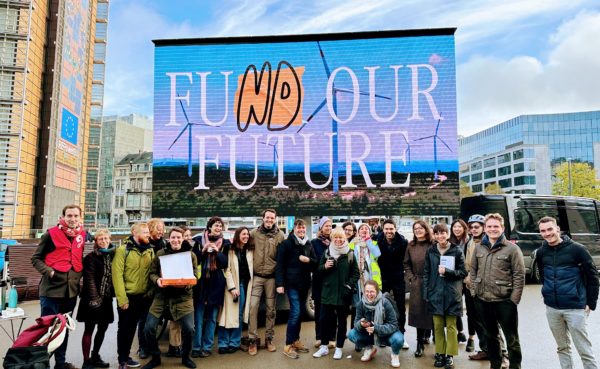EU Finance Ministers: Don’t FU** OUR FUTURE. FUND OUR FUTURE.

Brussels – The European Environmental Bureau, European Youth Forum, Climate Action Network (CAN) Europe, Social Platform, and the European Trade Union Confederation, as part of Fiscal Matters Coalition, are calling on finance ministers to “FUND OUR FUTURE” ahead of key discussions by EU finance ministers on new fiscal rules. For this, we will stage a stunt on November 9th, from 08.30 am to 10.30 am, in which an animation will be shown between the European Council and the Berlaymont building, depicting possible futures depending on whether nations agree to include an investment exemption that allows for enough ecological and social investments.
The reform of the EU’s fiscal rules
Public investments are crucial in speeding up a just transition and allowing everyone to access green and cost-saving solutions. Green public investments also have an outsized multiplier and, therefore, pay for themselves. They can transform our economies, attract new green manufacturing, create good quality jobs and reduce the cost of living through more energy-efficient quality homes, more accessible public transport and better public services.
Some countries, particularly Germany, want to implement unnecessarily strict ‘one size fits none’ debt and deficit rules. These so-called numerical benchmarks would undermine the Commission’s logic of more tailor-made debt and deficit reduction pathways. Other member states, such as France and Italy want to ensure that all member states can trigger crucial green public investments by allowing some form of investment exemption.
European Environmental Bureau
“The proposed fiscal rules are a short-sighted gamble with our future. They prioritize deficit reduction over long-term sustainability, preventing member states from investing in the green transition we need to transform our economies and avert climate catastrophe,” said Katharina Wiese, Policy Manager for Economic Transition and Gender Equality at the European Environmental Bureau (EEB).
European Youth Forum
“The coming decade is pivotal. My generation has been through austerity, Covid, and now we are facing the impact of the climate crisis. The German finance minister is withholding from us the tools that we need to secure our future. Without urgent public investment in the next years, we will not be able to build ourselves a life that is at least as good as that of our parents.”, said María Rodríguez Alcázar, President of the European Youth Forum.
Social Platform
“The severe damage caused by the last wave of austerity is still visible today: cuts to social protection, education, health & care services left deep scars and plunged people across Europe into poverty. Rather than prioritising arbitrary uniform debt and deficit reduction levels in the EU fiscal rules – and risking a return to austerity in some EU countries – we need to enable investment in people, equipping them to thrive, rather than just survive in the transition to climate neutrality. Without the support from people, the transition will fail,” said Laura de Bonfils, Secretary-General at Social Platform.
Next steps for new EU fiscal rules
EU Finance Ministers plan to reach a deal on EU fiscal rules at the ECOFIN Council on 9 and 10 November. In the European Parliament, Esther de Lange (EPP) and Margarida Marques (S&D) are co-leading as Rapporteur. Their report, which was published on October 13th, is currently under review by MEPs in the Economic and Monetary Affairs (ECON) committee. They hope to reach a deal by the end of the year. A final deal must be reached by February 2024 if it is to pass the legislative steps ahead of the legislative break ahead of the June 2024 European Parliament elections.
Fiscal Matters is a coalition of civil society organisations, think tanks, and trade unions, including notable organisations like the European Trade Union Confederation and the European Environment Bureau. United in concern over Europe’s current fiscal framework, the group advocates for policies prioritising social, economic, and environmental outcomes over mere debt reduction. Their endeavours include organising influential events, fostering public debates, and initiating collaborative actions to reshape European debt and deficit rules and address the continent’s pressing challenges.












































